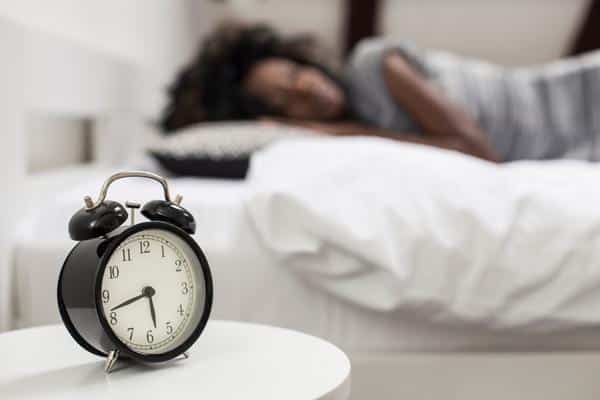Insomnia is hellish. There’s nothing more frustrating than lying in bed, tossing and turning, and knowing you’re going to be exhausted the next day.
If you struggle with getting good rest, you need to ensure you’re practicing good sleep hygiene. Simply put, this means making sure you have healthy sleep habits. If you need to improve your sleep hygiene, read on for my top seven tips for restful sleep.

1. Be Consistent
Sticking to a consistent sleep schedule can do wonders for your body’s internal clock, making it easier to fall asleep and wake up in the mornings. An additional benefit to perfecting your sleep cycle is reducing daytime grogginess.
Adhering to a sleep schedule can be challenging, particularly at weekends – who wants to forgo a Saturday lie-in?
However, sticking to the same plan daily can reduce your need to catch up on sleep debt at the weekend, reducing your desire to sleep away half the weekend.
2. Get Into A Routine
You can create a relaxing routine every night before bed to help you de-stress and help your body anticipate sleep.
Your bedtime routine should be personal and incorporate activities that you find relaxing. “A warm bath or shower is an excellent idea, particularly if you add some aromatherapeutic products, including lavender or camomile.
Aside from being relaxing, the drop in temperature after finishing your shower can help you feel sleepy,” explains Judith Lira, lifestyle writer at State of writing and Revieweal.
Some other ideas are yoga or gentle stretching, meditation, reading, or having a warm, caffeine-free drink.
3. Avoid Stimulants
Caffeine can seriously disrupt your sleep pattern. Its stimulant effects can last 6-8 hours, so after mid-afternoon, it’s wise to switch to a caffeine-free alternative.
Some people are tempted by a glass of brandy, wine, or other alcoholic drinks to help them sleep. While this can help you drift off, it causes disrupted, restless sleep, so you won’t thank yourself the following day. Instead, try natural sleep remedies such as lavender, valerian root, and cbn tincture. These can all help you get a restful night’s sleep without the stimulants.
4. Device Detox
Electronic devices are everywhere, and whether you’re using them for work or play, it isn’t easy to turn off. However, their blue light can wreak havoc on your circadian rhythm.
Blue light disrupts melatonin production, and as this chemical is key to controlling your sleep cycle, this can have a devastating impact on your ability to get a good night’s rest. So turn off your phone and other devices at least an hour before sleep.
5. Create The Perfect Sleep Environment
Piles of laundry and a floor littered with mess do nothing to help your insomnia. Even when your eyes are closed, you will be aware that you have chores that need to be taken care of subconsciously. For example, keep your sleep space tidy, change your bed sheets regularly, and open a window to get fresh air circulating.
Your bedroom temperature is also key to ensuring you get a rejuvenating sleep. “Generally, a temperature of 60°F to 67°F is perfect,” advises Freddie McLaughlin, health writer at Elite Assignment help and OX Essays.
You can also try blackout curtains, a sleep mask, and earplugs for a more restful sleep.
6. Separate Work And Rest
Reserve your bed for activities you want your brain to associate with this space.
Doing work-related activities such as answering emails or calling in your bedroom can cause your brain to associate bed and work. This means that, instead of feeling safe and relaxed when going to bed, your body associates bed with stressful tasks, and you feel more alert.
7. Say No To Napping
Finally, resist the urge to nap. While napping can be tempting, especially if you’ve had inadequate sleep the previous night, napping can make it harder to sleep at night and lead to grogginess during the day.
If you have to nap, try limiting your rest to 30 minutes or less, and avoid napping after lunchtime.
Final Thoughts
Good sleep hygiene is crucial to a restful, refreshing night of sleep. Also, avoid eating or drinking too close to bedtime, as this might disturb your night’s sleep in many ways. Incorporate the tips above to say goodbye to sleepless nights and start feeling awake and alert when it’s time to start your day.




